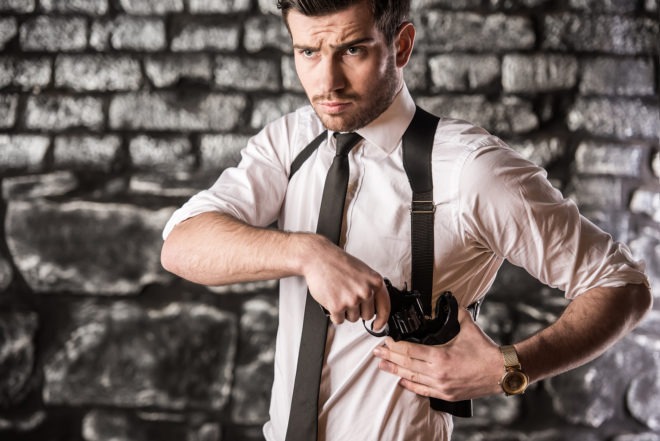

Call Attorney Marni Jo Snyder 24 Hours / 7 Days:
215.515.3360
Pennsylvania and federal laws restrict citizens from carrying firearms in certain locations.
Before someone carries a gun, they must have an up-to-date concealed carry permit as well as an LTCF (“License to Carry Firearm”) card. Carrying firearms without these items is prohibited in every location besides a person’s home and your business. There are currently no open carry laws on the books, which means it is not illegal.
For a free legal consultation, call 215.515.3360
Buildings or facilities that are funded partially or fully by government funding prohibit firearms. This includes locations such as courthouses, administrative or other local government buildings, libraries, jails and detention centers. It also includes public transportation that uses government funding and at fairs, festivals, parades, or other public events funded by the government.
Public parks and playgrounds are also usually funded by the government, so firearms are not allowed there.
Firearms are not allowed on school campuses, including primary school (grades K-12) and college campuses.
They are also prohibited at childcare facilities and areas owned by the childcare, such as walkways, parks, and libraries open to the public. This includes off campus areas like school busses, playgrounds, or off-campus school events.
Firearms are allowed in some busy public areas, such as convention centers (as long as they don’t prohibit them. Someone planning to go to a crowded event should contact the company or view the website of the venue to determine whether concealed carry is permitted.
Firearms aren’t allowed in an airport, nor at sporting locations such as stadium, arena, or at a sporting event. They are also not allowed in museums, zoos, and amusement parks. Likewise, racetracks and off-track betting locations prohibit the carrying of firearms.
To protect patients, firearms are not allowed in hospitals, nursing homes and mental health care facilities. Smaller healthcare locations, such as specialists’ offices or dental care facilities may allow firearms depending on the location.
By law, bars and clubs prohibit firearms. These laws are to protect the public, since the use of alcohol can make some people fight. Restaurants and other areas that serve alcohol, but do not rely on alcohol sales for the bulk of its income, may allow firearms. Whether they are allowed is at the discretion of the business owner.
Some locations which do not fall into specific categories, such as those listed above, also prohibit firearms. For example, firearms are not allowed at nuclear power plants or their parking lots.
Any owner of a private business has the right to prohibit firearms. The owner should hang a sign which states that firearms are prohibited there.
People with a concealed carry license who learn that firearms are prohibited at a location should not argue with the owner or try to bring the gun in undetected. With the exception of nuclear power plants, people can keep guns in their cars, but they should be placed in the trunk or glove compartment where it is out of view.
A homeowner or renter can prohibit firearms on their property. No signage is required, and the homeowner has the right to ask the carrier to leave the property or keep their gun outside of the home.
The restrictions for carrying firearms apply to those who are residents of Philadelphia, as well as business travelers or tourists.
People can carry firearms without a LTCF card if the firearm is unloaded and in a case, or while hunting in a permitted area with an appropriate hunting license, or while on a target range, or if licensed to carry a firearm in the person’s state of residence, or if someone is attending a gun show that is recognized by the Department of State Police.
Carrying a firearm without a license in Philadelphia and surrounding areas is considered a serious crime. Offenders can face fines of up to $15,000 and they can also face up to seven years of jail time depending on the circumstances. Not to mention having a felony on one’s record, losing the license to carry, and being ineligible to hold certain jobs.
If you or a loved one has been charged with a crime involving the carrying of a firearm, it is important to discuss your case with an experienced lawyer. Contact us today at 215-515-3360 so we can review your case and defend your right to carry. Consultations are free.
Call 24/7: 215.515.3360
Email: info@snyderlawyer.com
Fax: 215-376-6981
This website is for general informational purposes only. The act of sending an e-mail to the Firm or any attorney at the Firm, or submitting a form response or other materials through the website, will not create an attorney-client relationship. The only way to create an attorney-client relationship with the Firm is through a written agreement.Read More